Korea’s Pickier Food Consumption Through the Lens of COEX Food Week 2021
Despite COVID-19, Korea’s COEX Food Week 2021 ended successfully, while IRC Consulting was actively involved and exhibit as a representative for a client who could not physically travel to Korea due to COVID-19.
Organizers made a number of effective changes to the exhibition from the pre COVID-19 COEX Food Week events, and over 15,000 visitors showed up. The changes to the COEX Food Week event were a visible reflection of the wider and rapid changes in food and beverage industry trends.
As COVID-19 impacted almost every aspect of life, it also changed the dynamics of the entire food industry, increasing Korean consumers’ demand for global, better, faster, and healthier foods and beverages. Here we explain more about how the pandemic has been a part of several recent shifts in Korea’s food industry.
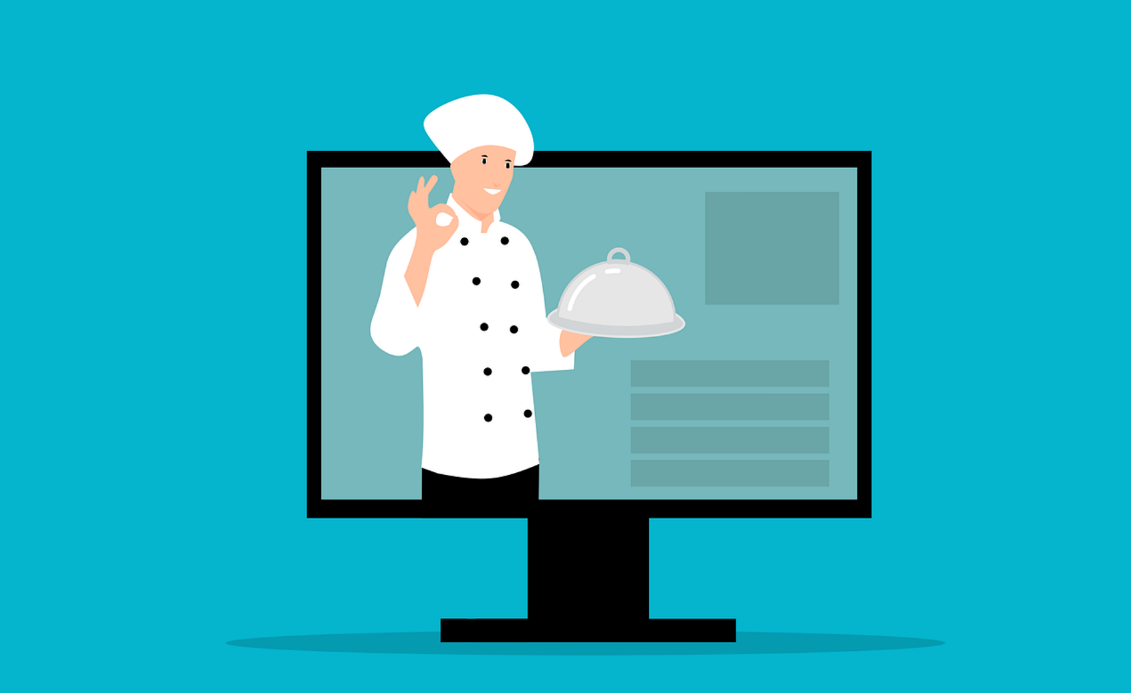
Source: pixabay
A Craving for International Foods
Korea depends on imported goods, especially for food. In 2020, Korea imported over 750,993 cases of food items, with a total value of approximately USD 27.2 billion. The value of food imports has steadily grown since 2013, despite a decrease in 2020 due to supply chain disruptions and country export stoppages due to COVID-19.
Food Imports Value Growth
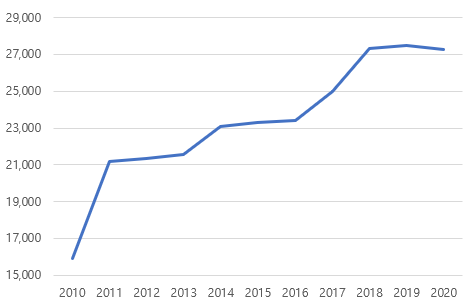
Source: Korea Statistics
Units: USD mil
Koreans always want something new and tend to seek it out. Food consumption patterns have largely moved away from the traditional meal of rice and soup. In 2007 close to 80% of the food sales revenue was from restaurants serving Korean food, but in 2020 that percentage dropped to 44%. Demands for international food have increased as more and more Koreans have experienced living and traveling overseas as well as due to the growth of the international community in Korea. Now in Korea it is easy to find restaurants that serve cuisine from countries all around the world.
A Very Selective Consumer
While particular about their food even before the pandemic, Korean consumers became pickier than ever after COVID-19, as demand for food that demonstrated high attention to taste was paired with increased concerns about health. The food industry experienced dramatic changes after COVID-19’s spread. Korea had an effective first response to COVID-19, but the second and third waves implanted greater fear about the virus. This chain of events transformed consumer attitudes, causing consumption habits to become more cautious and selective.
Dining in with Discriminating Tastes
As an initial response to COVID-19, the government announced social distancing restrictions that kept people from eating out. This was damaging to the food service business sector, causing numerous restaurants and stores to shut down. In December 2020 alone, the ratio of restaurant shutdowns to new openings was over 116.2%. On the other hand, this situation created new opportunities for food businesses that provided delivery and pick up services.
Restaurants with Delivery Services
|
|
2018
|
2019
|
2020
|
|
Delivery App
|
7.6%
|
11.2%
|
19.9%
|
|
Delivery Agents
|
5.4%
|
10%
|
15.4%
|
Source: Korea Statistics
After two years of COVID-19 measures, at-home food consumption trends changed significantly. While initially people thought COVID-19 to be a short-term situation, the pandemic and accompanying constraints on activity continued. Consumers started to change consumption patterns away from simply selecting between limited choices in delivery foods or home meal replacement (HMR) products to demanding a wider array of eat-in options.
One new type of HMR product that resulted to address this demand was restaurant meal replacement (RMR) products. Restaurants expanded their business to packaged products, which was a win-win for restaurants and consumers, as customers had more options and restaurants were able to realize a new source of profit. To avoid a drop in quality due to at-home preparation, RMR product providers focus on providing menus with simpler preparation methods to ensure the best quality and consistent taste.
Online Food Shopping Boom
As the amount of online shopping for food increased, food-related platforms and companies attracted consumers by developing easier and more effective customer journeys. Many of these developments focused on providing consumers with more product information and increased product variety.
Pre-COVID-19, when online food shopping was less common, consumers focused on a more limited set of details such as calories, nutrients, or price. However, after COVID-19, with an associated growth in concerns about health and the enormous surge in product variety, the demand for more information on product health benefits and even environmental impact started to grow as well.
Online Food Shopping Value Growth (KRW bil)
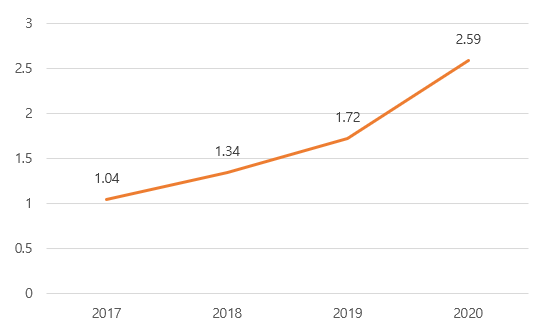
Source: Korea Statistics
A Premium Appetite for Revenge
During the COVID-19 pandemic, the luxury fashion industry grew significantly in Korea. Korea’s designer goods consumption in 2020 reached the top 7th ranking globally, with a further 45% increase in sales during the first half of 2021. The trend toward upscale products has now also been observed in the food and beverage industry. While the food market overall has been price sensitive, data show increased sales of premium products. Consumers are engaging in what has been termed “revenge spending,” which is people’s tendency to spend lavishly to reduce stress by purchasing products they would not buy in normal circumstances. The Seoul Institute (https://www.si.re.kr/) looked at the spending of 1,200 Seoul households to research this behavior. The results showed that 44% of revenge spending was for food, which was the leading expense overall. The survey also showed that 27% of the survey sample would be willing to revenge spend on food.
With Korea’s haste-loving “fast-fast culture,” trends tend to change rapidly. Adding to that the ongoing issue of COVID-19 and the path of the governmental response, it is safe to predict that more changes in the food business sector will occur before Korea reaches a ‘new normal’ way of doing business. To learn more about the changes and trends in Korea’s unique market, please view our other articles by visiting http://www.ircconsultingkorea.com.
COEX Food Week 2021 Fast Facts
- Date: November 24th to 27th, 2021
- Location: COEX Halls A and B, Gangnam District, Seoul, South Korea
- Organized by COEX Co. Ltd, COEX Food Week is supported by Korea’s Ministry of Trade, Industry and Energy and the Ministry of Food and Drug Safety. It is one of Korea’s largest food and beverage exhibitions and concurrently runs associated events such as the Korea Bakery Show and the Food Industry Technology Show Korea.
- Exhibits: Food & Beverage, Machinery & Kitchen Utensils, Cooking Equipment & Kitchen Utensils, Café Interior & Store Facilities, Food Safety and more.
- Official website http://coexfoodweek.com/
COEX Food Week is one of Korea’s largest trade fairs for Korea’s domestic food and beverage industry. From 24 November to 27 November 2021, COEX Food Week welcomed more than 15,000 visitors.
Launched in 2006, the four-day event showcases everything from food products to food preparation and manufacturing equipment to buyers and sellers from around the world, seeking to create new business opportunities in both domestic and international markets. The show also aims to be a fun day out for the general public through various live events offering them the chance to sample new fare, learn cooking tips, and see professional demonstrations.
To confront the realities of the post-COVID-19 era the show now includes an online platform together with the offline show. This innovative strategy offers Online Biz-matching programs for overseas buyers and exhibitors.
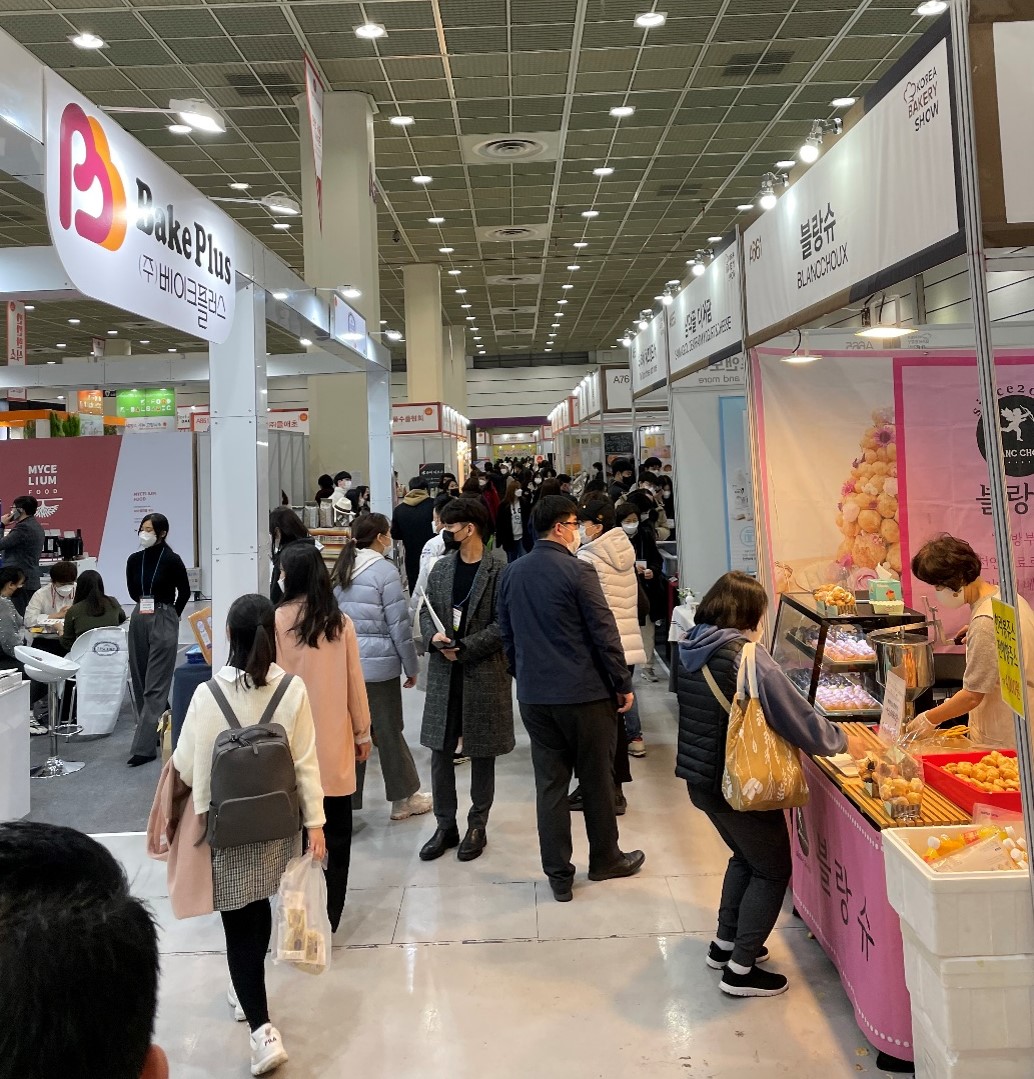
COEX Food Week 2021 had a far greater number of visitors than other recent domestic exhibitions. Government relaxations of previous COVID-19 restrictions led in part to the enthusiastic attendance levels for the event. Despite requirements such as mandatory masks, some restrictions on eating areas, and attendee monitoring systems, visitors and exhibitors experienced little difficulty in participating.
The relatively large number of COEX Food Week 2021 exhibitor booths dedicated to international foods, HMR, and health-related food products demonstrated the trends discussed above. However, within the large event space many other varied items were on offer, such as exhibitors focused on food machinery, bakery items and the regional products segment of the food industry.
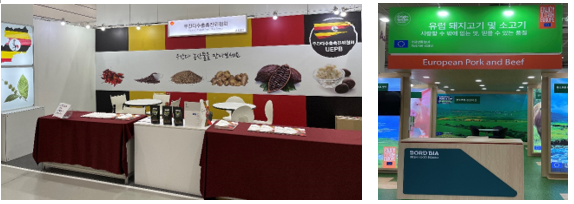
Prevailing difficulties in planning international travel were evident in the lesser number of foreign attendees compared to past years. However, overseas companies and organizations were still well-represented. Among the clusters of booths from the EU, Japan and many other countries, most were represented onsite by a Korean partner or local representative. IRC Consulting also attended in that capacity, representing a client..
HMR attracted visitors with the offer of great taste paired with simple preparation at home. Most of the HMR exhibits this year were centered on Korean meals or dishes.
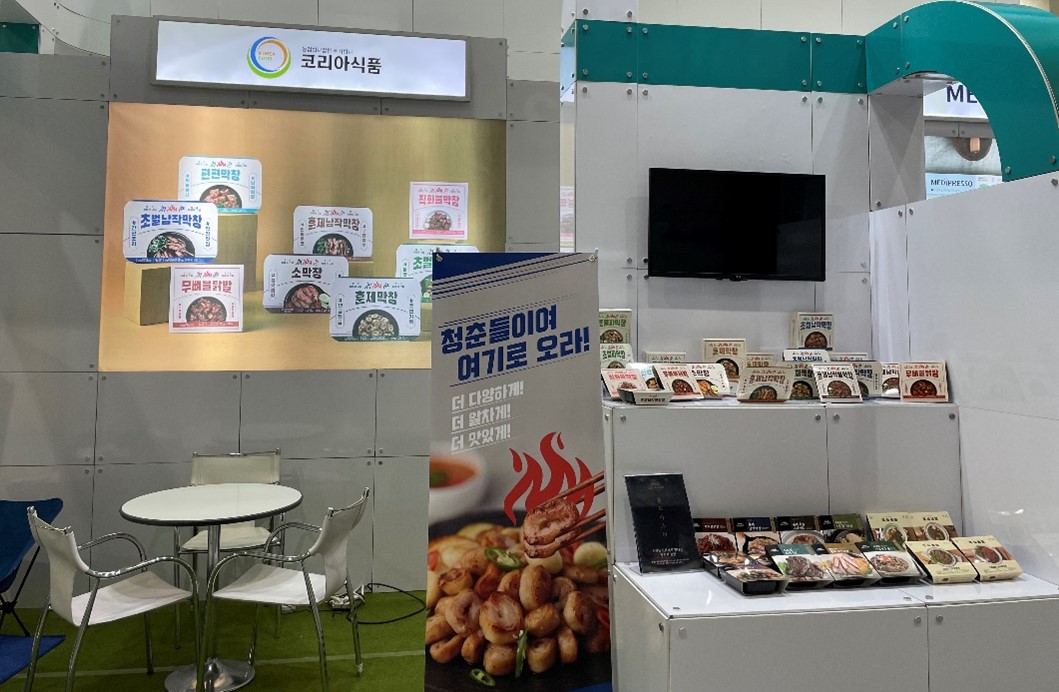
Some HMR producers shared space with regional product booths. There were also individual companies providing white label and OEM services
Health supplement products were on display at the event as well. there were a number of company booths to visit offering a variety of products for the interested to make inquiries or obtain more information.
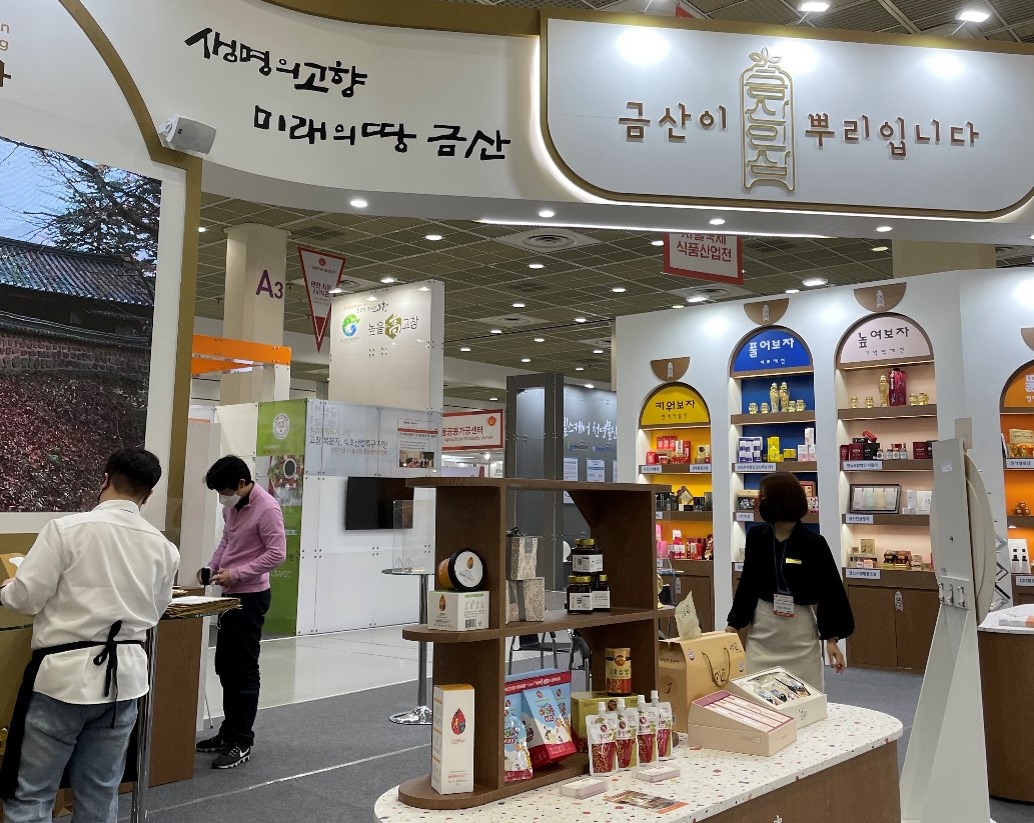
The Korea Bakery Show was concurrently hosting several bakery competitions over the course of the week. This and other spectator-friendly events provided visibility for bakery related products, supplies and equipment companies.

Overall, despite the challenging backdrop of COVID-19, COEX Food Week again provided a worthwhile venue for businesses to showcase food industry products and an opportunity to connect with interested business concerns and consumers alike. In addition to being a key part of each year for food businesses in Korea, it is also a touchstone for food trend and market observers. As the world continues to adjust to doing business in the ”new normal” we are hopeful that 2022 will see a COEX Food Week that is an even more vibrant and plenteous marketplace of opportunity for the food industry.
|